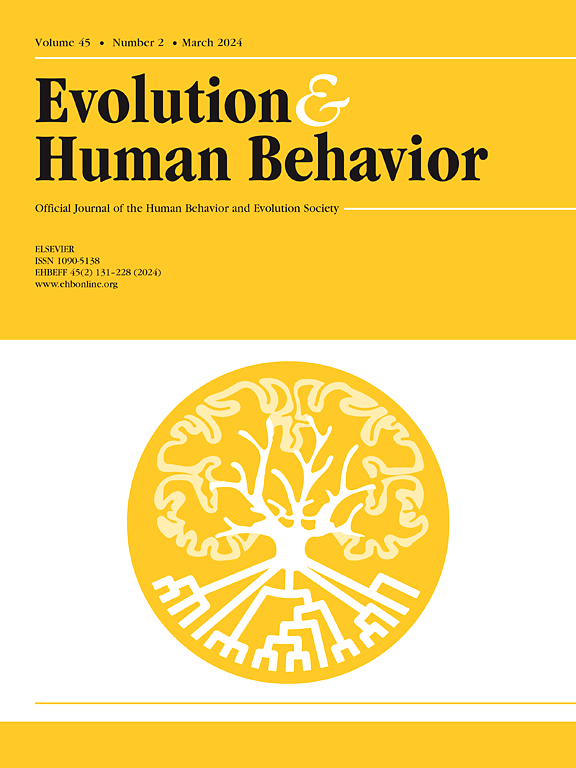Decreased sexual motivation during the human implantation window
IF 3.2
1区 心理学
Q1 BEHAVIORAL SCIENCES
引用次数: 0
Abstract
The implantation window denotes cycle days when the endometrium is receptive to an implanting blastocyst. Research supports increased risk of some types of sexually transmitted infections at this time due to local immunosuppression that facilitates the implantation process. This heightened infection risk may have selected for downregulation of sexual motivation within the mid-luteal phase days that comprise the human window of implantation. Here, using data from three large, daily diary studies (N > 2500 observations) among undergraduate participants, we tested whether measures of women's sexual motivation were dampened during the implantation window. Multi-level regression analyses on the combined sample demonstrated significant drops in multiple measures of sexual motivation within the estimated implantation window relative to other cycle regions. Furthermore, for most measures, sexual motivation was significantly lower during the implantation window relative to non-menstrual cycle days outside the fertile window, such that mid-luteal drops in desire and behavior were not statistical artifacts of elevations in sexual motivation during the fertile window. These findings are consistent with evolved, functional responses to temporal fluctuations in infection risk that may help to explain cycle phase shifts in human sexual motivation.
在人类植入期间性动机降低
着床窗口表示子宫内膜接受着床囊胚的周期天数。研究表明,由于局部免疫抑制促进了植入过程,因此此时某些类型的性传播感染的风险增加。这种较高的感染风险可能选择了在黄体中期(包括人类植入窗口)的性动机下调。在这里,我们使用来自三个大型的、每日日记研究的数据(N >; 2500观察),在大学生参与者中,我们测试了女性性动机的测量是否在植入窗口期间受到抑制。对联合样本的多水平回归分析表明,相对于其他周期区域,在估计的植入窗口内,性动机的多项测量显着下降。此外,在大多数测量中,植入窗口期间的性动机明显低于受孕窗口以外的非月经周期,因此黄体中期性欲和行为的下降并不是受孕窗口期间性动机升高的统计产物。这些发现与进化的,对感染风险的时间波动的功能性反应是一致的,这可能有助于解释人类性动机的周期相移。
本文章由计算机程序翻译,如有差异,请以英文原文为准。
求助全文
约1分钟内获得全文
求助全文
来源期刊

Evolution and Human Behavior
生物-行为科学
CiteScore
8.30
自引率
9.80%
发文量
62
审稿时长
82 days
期刊介绍:
Evolution and Human Behavior is an interdisciplinary journal, presenting research reports and theory in which evolutionary perspectives are brought to bear on the study of human behavior. It is primarily a scientific journal, but submissions from scholars in the humanities are also encouraged. Papers reporting on theoretical and empirical work on other species will be welcome if their relevance to the human animal is apparent.
 求助内容:
求助内容: 应助结果提醒方式:
应助结果提醒方式:


